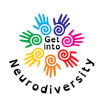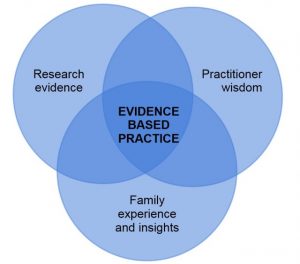Research and Research Evidence
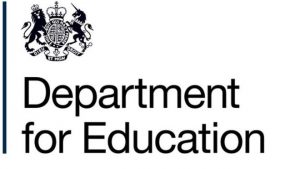
Accredited Teacher Training in Specific Learning Difficulties and Neurodiversity is core training and suitable for all educators. It includes; a Specific Learning Difficulties Guide, Checklists, Strength Profilers and the hundreds of Teaching Strategies that are evidence based and thoroughly and rigorously reviewed.
The course was written for the UK Department for Education by experts within the field of Specific Learning Difficulties including; Liz Horobin, Steve Chinn, Fintan O’Regan, Gill Dixon, Betsy DeThierry, Ambitious about Autism, Jennie Price, Mary Hartshorne, Ronit Bird, The National Handwriting Association and many more, and is based on hundreds of international studies. Presented as the authors intended by specialist teachers for schools. This course is presented by Liz Dunoon and Jillian Zocher, and repurposed for an international audience.
Initial research evidence proves that Teacher Training for Students with Neurodiversity produces positive educational results for Australian educators as reported by Extol Analytics Pty. Ltd. Read the report here.
Research evidence proves that Teacher Training for Students with Neurodiversity produces positive educational results as reported by the Manchester Metropolitan University Educational and Social Research Institute report. Read the report here.
This course has been designed to focus at core skill level to improve the level of understanding of Specific Learning Difficulties and the impact of motivation, anxiety and trauma on education and learning.
This online, on demand course offers school leaders, advanced level teachers and allied health professionals the ideal platform to cascade a core-level training to all teachers and educators. Hundreds of further links to evidence are provided within the course material.
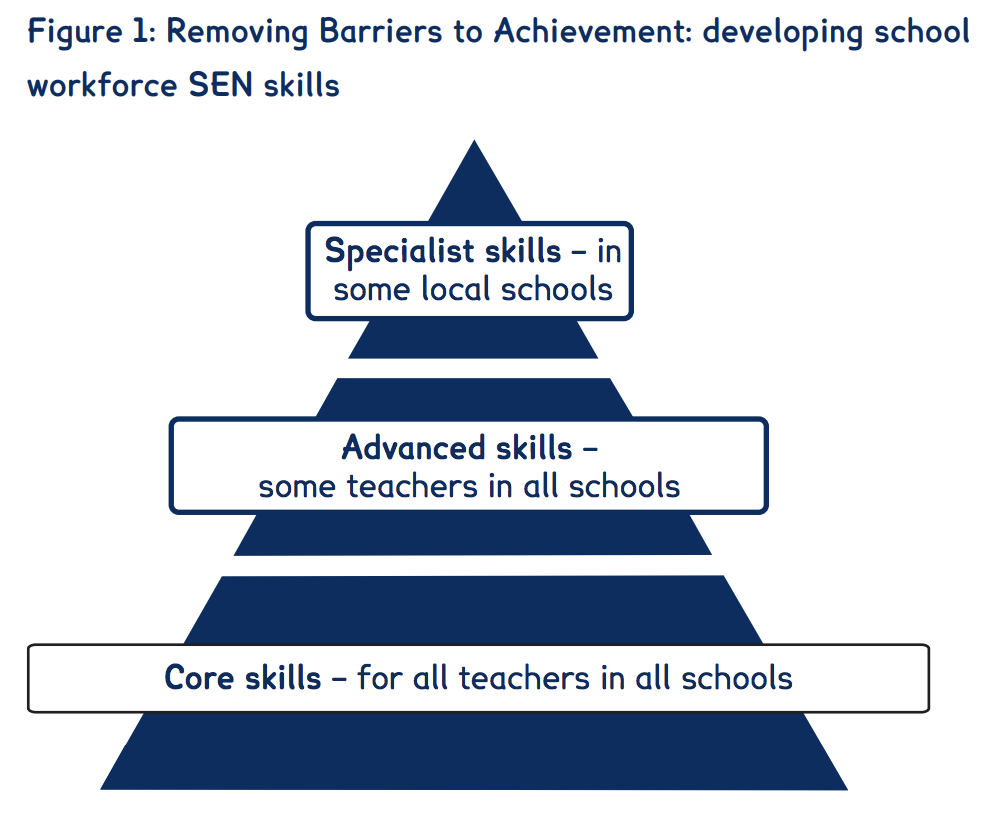
Source: Rose Report
Read the Rose Report here.
Metacognition, understanding unique individual strengths, and self-regulation approaches have consistently shown high levels of impact and are the key focus areas within this course as explained by the Education Endowment Foundation.
Understanding of a learner’s Specific Learning Difficulties whilst incorporating evidence-based motivation strategies, maximises its effectiveness as discussed in the Routledge journal article Academic Motivation in Children with Dyslexia.
John Hattie’s extensive research enables schools and districts around the world to effectively implement the most effective teaching strategies. (Read John Hatties Research papers here). Best practice includes teachers addressing Specific Learning Difficulties and research can be found within the numerous International Dyslexia Association fact sheets. ( https://dyslexiaida.org/fact-sheets/ )
Further evidence relating to anxiety and its impact on learning can be found in The Human Cost of Dyslexia, a recent enquiry into the effects of a Specific learning difficulty left unaddressed.
The following is a graphic representation of some of the key findings from the Human cost of Dyslexia enquiry.
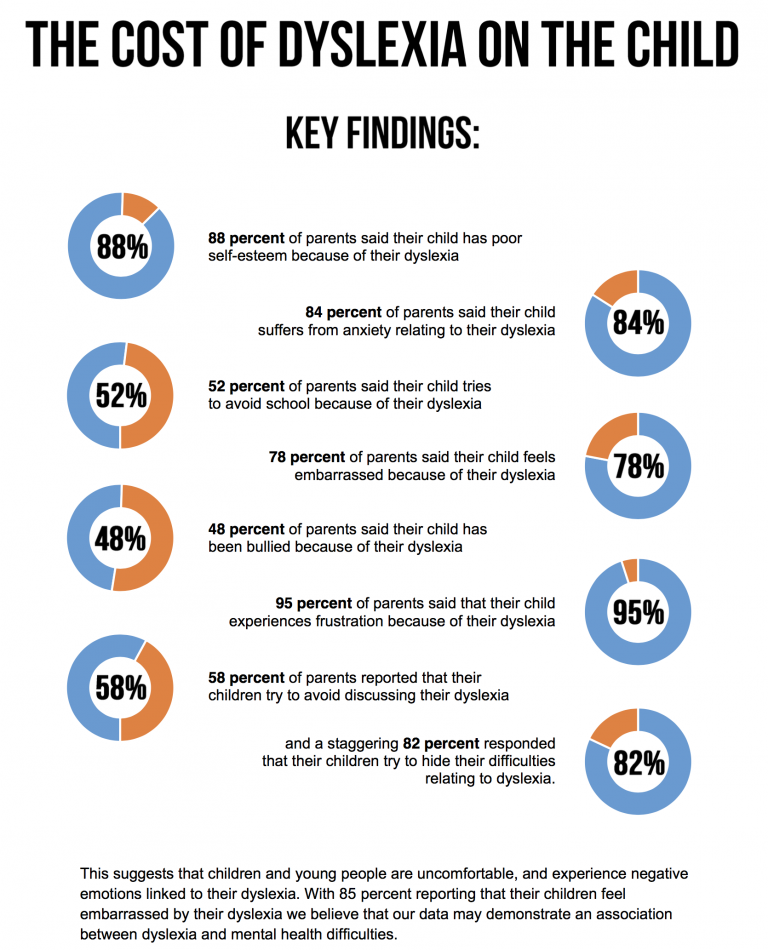
The prevalence of trauma in today’s society and its impact on learning and behaviour can be found at https://www.trc-uk.org/an-understanding-of-trauma
The term Neurodiversity is used as a means of empowerment to promote the positive qualities possessed by those with a neurological difference. It encourages people to view neurological differences such as; autism, dyslexia and dyspraxia as natural and normal variations of the human genome. Further, it encourages them to reject the culturally entrenched negativity which has typically surrounded those that live, learn and view the world differently. Further evidence can be found in Steve Silberman’s, Neurotribes: The Legacy of Autism and the Future of Neurodiversity (Barnes Noble, 2015).
Research and research evidence play a crucial role in discoveries and ensuring that we as educators make a difference. ‘Evidenced based’ practice is accepted as a decision-making process that incorporates the best research evidence along with the best clinical experience, consistent with family experience and insights.
Family and community sectors, including the education sector, face a wide range of complex problems in which there are no clearly defined ‘solutions’ and what might help one student may not help another.
Evidence-based practice has many advantages including:
- It helps us to be more effective
- It helps us to be sure that learners have improved life outcomes
- Using data and evidence from a range of sources can help us achieve better results and help towards developing independent learners
- Critical reflection of each learner leads to better practice and innovation
Evidence-based practice and Innovation
Things to consider:
- There are no simple finite answers to a complex problem
- Not all forward progress is related to only one therapy and a multi-disciplinary approach is often necessary
- Some products and research projects may overclaim their success
- Research may prove that something works for most children, yet can’t say it works for all children.
- Research may prove that something works for fewer children, yet it cannot say it doesn’t work at all.
- Research studies that focus on one facet, make the study difficult as children are complex learners and so the samples need to be picked very carefully e.g. candidates may not be hand-picked for a trial study if they have concentration or behaviour issues.
- Research participants are not always truly representative of the whole population i.e. some may not have had the same opportunities as others in life.
- Always look for evidence-based programs – Evidence based means disciplines that emphasize the practical application of the findings of the best available current research.
- Teachers and practitioners should always consider the need and vulnerability of the parents and carers.
The Nationally Consistent Collection of Data on school students with disability (NCCD) is an annual collection of information about Australian school students with disability.
☑ The checklists within these courses will enable teachers to identify patterns of learning disability behaviours to determine whether a student is eligible for further support at school and consider whether:
- There is evidence at the school that the student is being provided with an educational adjustment to meet ongoing, long-term specific needs associated with disability.
- Decisions have been made in consultation with the student and/or their parents, guardians or carers.
These adjustments are provided through usual school processes, without drawing on additional resources, and by meeting proficient-level Teaching Standards as stated by the Australian Institute for Teaching and School Leadership.
- Explicit, minor adjustments, including targeted or differentiated teaching, assessments or activities
- Specific and relevant teaching strategies to support targeted areas of communication
- Active monitoring and supervision, meeting health, personal care and safety requirements through usual school processes
- Enabling access to learning through usual school processes (e.g. through a differentiated approach to teaching and learning) and existing facilities (e.g. existing modifications to buildings and learning environments).
Further information can be found at https://www.nccd.edu.au/
In conclusion, Teacher Training for Students with Neurodiversity helps school leaders manage the cascading of evidence based, quality, time efficient and cost-effective professional development to educators at all levels.
Should you have any questions relating to the research evidence behind this training, the authors listed above are available to answer your questions. Please email us at info@getintoneurodiversity.com
Liz Dunoon & Jillian Zocher
